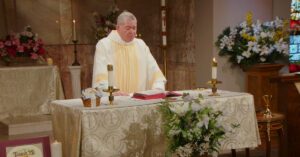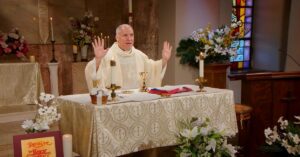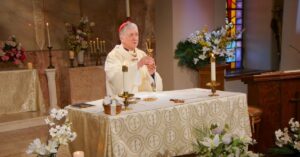Easter Sunday of the Resurrection of the Lord
Homily Video
Easter Sunday of the Resurrection of the Lord Homily Transcript
Again I want to great all of you on this Easter day, especially those who are watching this televised mass, those of you who are in nursing homes and hospitals and your own homes with families, to let you know that we are especially remembering you and praying for you on this day. Historians tell us that histories and also biographies should not be written for at least 50 years after the event or the death of the person and surly not before 20 years. That is because it’s important to realize that history is not just about recording a certain event, but rather it’s measuring the impact of the event or the person on society, on human history, what way that they influenced the arch of history. That seems to be at play here in the readings, for we don’t any report of the actual event of Jesus’ resurrection. There are no eye witnesses to what took place. But rather what we have, especially in the first reading, is the impact of the power of the resurrection on the disciples of Jesus. These poor, illiterate, lowly fishermen are now taking a prominent place in society, speaking in a way that will eventually change the course of human history.
So what are the signs that we should look for in our world and in our life today that in some way helps us understand that the same spirit that raised Jesus from the dead is very much active and alive in our world, in our life today? What were the signs that those early Christians saw that Jesus rose from the dead even before he made an appearance to them? What things have changed? How was their life transformed?
The gospel text that we have here from the 20th chapter of John gives us some indication. The first is that these disciples were able to come out of hiding and they were to come out of their divisiveness that was there. They scattered when Jesus was crucified. They went to their own places. They had recrimination against each other for one of them betraying Jesus and the other denying him as Peter did. So Mary had to go seek them out. She came in a way to bring them together, these two disciples who went to that tomb. And so it is in our lives.
We know that there are spirits that move the human hear that divide us. We see that in our own families, where we in some way marginalize someone that either has done something wrong or that has offended us. So we allow division, that spirit of division and a sense of real revenge or a way in which we allow ourselves to be permanently divided from that person to take hold of our lives and our families. We see it as well in the world where a divisive spirit in some way marginalizes people who are poor and needy or those who are migrants, refugees, in a world today that wants to be somewhat afraid of those who are different.
We know how the sprit of evil can be there, but we also know the impact of the sprit of unity, when our families get together. Some weeks ago, I experienced that in a real way with my family. I turned that magic age of 70, starting my eight decade. My eight siblings surprised me. They came in town from all over the United States to surprise me with a birthday party. Now, it doesn’t mean that all our family gets along on everything, but it was that moment of the family coming together that really impressed upon me the power of unity, the power in which we set aside our differences and we allowed ourselves to come together in a way that unites us. That is what we need continually in the life of the church, in our families and in society. That is the work of the holy sprit, the work that brought Jesus back from the dead that we see having an impact on that early church.
So whenever we in some way cultivate that sprit of unity in our family, in society, in our world, in our church, we should recognize it as the work of the holy spirit that brought Jesus back from the dead. That was the impact that was had on those disciples.
The second thing we see is that those two disciples who came to the tomb we’re unafraid to go into the tomb, to see the burial cloths and to realize that Jesus not only rose from the dead, but he left aside any remnant of death, those burial cloths that were there. How often fear of our mortality, of our limitations, so often in life can make us do things that we regret afterwards in which we selfishly want to have our own way or own pleasures and comforts as opposed to caring for others. Ways in which we so often as well give into a competitive spirit where we think that we’re going to be less because we share what we have with others.
It was that putting aside of fear of our limitations, of death that was part of the impact of the resurrection of the dead for those disciples who were there. We all know that we give into those doubts about weather or not there will be something after death. My mother, after she lost her husband, my father, they were married for 57 year. It was very difficult and she began to doubt weather or not she would ever see my father again. It’s natural for us to do that. But she had the benefit of living right next door to the cemetery where my father was buried. On certain days of the year, Christmas and Easter, their anniversary, his birthday, she would arrange with the caretaker of the cemetery to put one of those nice big sanctuary lamps out over his tomb and she could look out her window at night and see it. That gave her a sense of hope. That was a sign for her that she should not be afraid of death.
Well that was also so present in this early church. We need to look for signs that remind us that we should never be afraid of our limitations in death to the point where we begin to be selfish in our own desires. Finally we have these disciples who really don’t understand what’s really going on. They don’t understand what it means for Jesus to rise from the dead. That speaks to the ambiguity in our life. We want things so often nailed down. We want it black and white. We don’t like any, “ifs” or “could have beens,” but that’s the way human life is.
They have taught us through the scripture text to date that the power of the resurrection is also about accepting the incompleteness of life, that we are all on a journey, and that we should not in someway become impatient or frustrated by that. There are a lot of things that are incomplete, left undone in all of our lives. Yet that should not in any way create in us a sense of anxiety just because we can’t be in control of everything. I think those are all signs of the power and the impact of the resurrection. That is way the story of Jesus is told not so much by the event, but the impact it had. It created unity within that community of disciples. It helped them displace that sense of fear, but it also gave them an understanding that the Lord is working in the incompletenesses of life, the in-between, and that with don’t have to have everything nailed down ’cause the Lord is with us in those moments.
So it is the impact that this event of the resurrection has in our live, but maybe we should also give thanks to the impact that people have had on us. Some years ago when I was in a perish, I was getting ready for mass one Saturday afternoon and a man walked in the back of the church and he saw me walking back and forth. He came up to me and he said to me, ” Do you know who John Mayhan is?” I said, “Well yes. Why would you ask?” But he said, “We were great friends when we were teenagers, long time ago. I just came back to town and when I saw you walk back and forth you look just like John Mayhan.” Well I said, “Interestingly enough, John Mayhan was my grandfather.”
He saw someway in which I reflected something about a grandfather that I loved dearly that I always tried to emulate. Maybe I did pick up his walk as well as hopefully some of his good habits. But people do have an impact on us. Today we are asked by the gospel to see how the resurrection has an impact on us. Do we foster unity? Do we put aside our fear of our limitations? And can we live with the in-between in life? That’s the way to celebrate the resurrection today.
Readings
First Reading:
Acts 10:34a, 37-43
Second Reading:
Colossians 3:1-4 or 1 Corinthians 5:6b-8
Gospel:
John 20:1-9 or Luke 24:1-12
Featured Text
A special thank you this week to our friends of Mercy Home for Boys & Girls in the congregation.
Discover More
Third Sunday of Easter
April 14, 2024
Second Sunday of Easter
April 7, 2024
Easter Sunday of the Resurrection of the Lord
March 31, 2024
Request Sunday Mass Guide
The Sunday Mass Guide sent to your home address
Spiritual nourishment and updates from the Sunday Mass community
Monthly reflections from Fr. Scott Donahue, our Principal Celebrant



